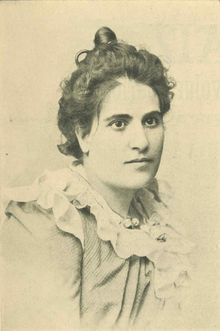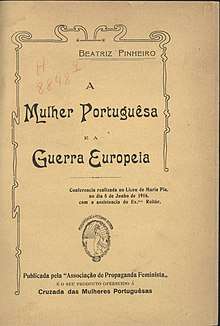Beatriz Pinheiro
Beatriz Pinheiro or Beatriz Paes Pinheiro de Lemos (1872 – 1922) was a Portuguese writer concerned with improving the rights of women. She was a pacifist who became convinced that Portugal should fight in the First World War.
Beatriz Pinheiro | |
|---|---|
 | |
| Born | 1872 Viseu |
| Died | 1922 Lisbon |
| Occupation | editor and writer |
| Nationality | Portugal |
| Subject | Women's rights |
Life

Pinheiro was born in Viseu in central Portugal in 1872.
She and the poet Carlos de Lemos published an arts magazine in Viseu named Ave Azul ("Bluebird") which ran for twelve issues in 1899 and 1900.[1] In the magazine they published revolutionary ideas about the rights of women. They thought that a woman should be able to create a dignified life for herself without the need of a man. She called on readers to champion the rights of women to compete in education on an equal footing with men and to gain their right to equal civil and political equality. She lauded Alice Pestana's Portuguese League for Peace founded in 1899. Pinheiro believed that educated women could contribute to creating world peace. These were revolutionary ideas. Pestana was also publishing her ideas but under a nom de plume of Cil in the newspaper Vanguardia.[2]
She became the representative of the Portuguese League for Peace and she used her writing to further its republican ideals in Viseu. She wrote for A Beira, Almanaque de Senhoras, Alma feminina or A Crónica. In time she and Carlos found it better to move to Lisbon.[3] When the Republic was formed, on October 5, 1910, Beatriz Pinheiro was in Lisbon, participating in the campaign to approve the Divorce Law. In June 1913, she, Ana Augusta de Castilho, Ana de Castro Osório, Luthgarda de Caires, Joana de Almeida Nogueira and Maria Veleda were part of the Portuguese delegation at the Seventh Conference of the International Woman Suffrage Alliance in Budapest.[3]
During the First World War on 8 June 1916 she held a conference at Liceu Maria Pia where she was teaching.[3] As a result she published A Mulher Portuguêsa e a Guerra Europeia (Portuguese Women and the European War).[4] This was a defining moment as Pinheiro who was a known pacifist and radical, defended Portugal's participation in World War I.[3]
Pinheiro died in Lisbon in 1922.
Works
References
- "Ave Azul [1899-1900]". hemerotecadigital.cm-lisboa.pt. Retrieved 2020-06-09.
- Bermúdez, Silvia; Johnson, Roberta (2018-01-01). A New History of Iberian Feminisms. University of Toronto Press. p. 108. ISBN 978-1-4875-2008-3.
- FERREIRA SILVEIRA, ANABELA (2017). [file:///home/chronos/u-7258dc23e9c2be6cc4ca55648fe7282199d8c0be/MyFiles/Downloads/7912-22633-1-PB.pdf "O PROTAGONISMO DE BEATRIZ PINHEIRO NA REVISTA VISEENSE AVE AZUL (1899-1900)"] Check
|url=value (help) (PDF). Historiæ, Rio Grande. 8 No. 2: 77–95. - "A mulher portuguêsa e a guerra europeia". purl.pt. Retrieved 2020-06-09.
- Puga, Rogério Miguel (2020-05-15). Chronology of Portuguese Literature: 1128-2000 (in Portuguese). Cambridge Scholars Publishing. ISBN 978-1-5275-5125-1.